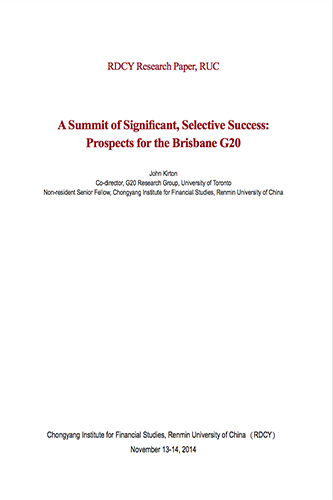发布时间:2014-11-26 作者: 人大重阳
The ninth Group of Twenty (G20) summit, taking place in Brisbane, Australia on November 15- 16, 2014, is an unusually significant event. It comes with the unprecedented geopolitical drama and risks arising from Russia’s forceful annexation of Crimea, its subsequent military incursions in eastern Ukraine, and the question of whether President Putin will actually attend the summit and how he will be treated there if he does.

John Kirton, Co-director, G20 Research Group, University of Toronto Non-resident Senior Fellow, Chongyang Institute for Financial Studies, Renmin University of China.
At the same time, G20 leaders, confronting a slowing, struggling global economy, need to deliver the G20’s centrepiece promise for the Brisbane summit of raising growth 2% above trend over the following ve years. They also have a formidable, carefully constructed full scale economic agenda, focused on the Australian host’s priorities of creating growth and jobs, stronger nancial regulation, tax fairness, freer trade and infrastructure nance, along with anti-corruption, money laundering, and terrorist nance.
To deal with these tasks, Australia’s rst G20 summit as host will be chaired by Prime Minister Tony Abbott, attending his rst G20 summit, backed by just over a year’s experience as Australia’s leader and standing at a relatively low approval rating in the polls. He will be joined as a newcomer by Indonesia’s Joko Widodo, India’s Narendra Modi, Italy’s Matteo Renzi and Turkey’s Ahmet Davutoglu (who is due to host the 2015 summit), and the recent arrivals of China’s Xi Jinping, Korea’s Park Geun-hye and Mexico’s Enrique Pena Nieto. Coming with more experience are Russia’s Vladimir Putin, who hosted the previous G20 summit in St. Petersburg in September 2013, Brazil’s Dilma Rousseff, France’s François Hollande and the United Kingdom’s David Cameron, the US’s Barack Obama and South Africa’s Jacob Zuma. Arriving as G20 summit founders who have attended every one are Canada’s Stephen Harper, Germany’s Angela Merkel and Argentina’s Cristina Kirchner. At their side as fellow G20 members will be the two new leaders of the European Union, Christine Lagarde of the International Monetary Fund (IMF) and Jim Yong Kim of the World Bank. Their task is to meet, build upon and exceed the growing performance of eight G8 summits held since their start in November 2008 amidst the global nancial crisis erupting then (Kirton 2014a) (See Appendix A).